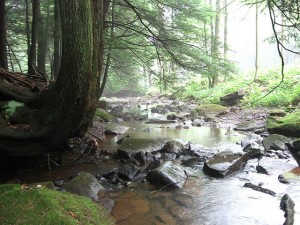DEP reverses decision over waste water disposal well

Adapted from the National Energy Technology Laboratory / Environmental Protection Agency
Diagram of a deep well injection disposal site.
The Department of Environmental Protection took the unusual step of reversing its approval of a frack waste water disposal well in Indiana County this week. The decision took both the energy company and the opponents of the disposal well, by surprise.
“This is novel, this has not happened previously,” Pennsylvania General Energy vice president Lisa McManus told StateImpact. “So it came as a complete surprise to us.”
Pennsylvania General Energy, or PGE, received the green light from the DEP in October to convert a former gas producing well in Grant Township into a disposal well. This came after the Environmental Protection Agency approved the project last spring. The EPA has overseen deep injection wells in Pennsylvania since 1983. Those wells are designated as Class 2 wells and are regulated by the underground injection control program, via the Safe Drinking Water Act. Although about 1,860 Class 2 wells are permitted in Pennsylvania, less than ten of them are approved for oil and gas waste disposal.
Still the DEP needed to sign off on the conversion of the Grant Township well’s function. DEP issued PGE a permit in October, but two residents of Grant Township appealed the decision.
Because Pennsylvania has so few disposal wells, there’s been a push by oil and gas producers to build more rather than truck their wastewater out of state to Ohio. DEP spokesman John Poister says frack water disposal wells, also known as deep injection wells, are still new territory for the DEP.
“In the past, we didn’t really come across injection wells very often,” said Poister. “We’ve always looked at it as, we approve the hole and the EPA does everything else. But I think we looked at it as an oil and gas issue and not as a water issue.”
The mother daughter team of Judy Wanchisn and Stacy Long, each members of the East Run Hellbenders Society, filed the appeal to DEP in November. The DEP appeal is just one strategy in the Hellbenders’ fight against the Grant Township injection well. They also filed an appeal to the EPA, and lost. Last year Grant Township banned deep injection wells through an ordinance, which they will soon need to defend in federal court. But in this successful appeal to the DEP, they cited regulations under the state’s Clean Streams Law, which the DEP did not take into account when approving the PGE permit.
The DEP’s John Poister said that by rescinding the approval of the PGE disposal well, they want to reevaluate the criteria used to approve these wells.
“We are taking the matter under review right now,” said Poister. “We’re going to review our policies. So right now it’s kind of a work in progress.”
Poister says its unclear whether this will lead to any significant policy changes at the DEP.
“Right now this only applies to this case,” he said. “Could it result in something broader? I can’t answer that right now.”
In the meantime, Wanchisn and Long withdrew their appeal. And DEP encouraged PGE to reapply.
PGE’s McManus says PGE plans to submit a new application.
“We fully anticipate that the permit will be reissued,” said McManus.
McManus says she doesn’t believe the section of the Clean Streams Law, which the DEP says it will use to review the new permit, applies to deep injection wells.
“It’s primarily something that addresses discharge of waste into abandoned mines and wells,” she said. “I think it’s likely that this particular provision has no application to injection wells. I think DEP just wants to be on the safe side.”
Grant Township resident Judy Wanchisn says she too was surprised by DEP’s decision. Wanchisn appealed because she’s worried that the well could pollute her ground water and the surface waters of the Little Mahoning watershed. Although the well is not on her property, she says the waste water could travel underneath.
“Now they want to take the toxic cocktail that they produced and push it back down into a well where they got the gas,” Wanchisn told StateImpact. “Now I’m getting waste put under my property without my permission. I can’t imagine what would happen. There’s more harms than benefits. I can’t find any kind of benefit other than it’s benefitting the gas company.”
Wanchisn says the well lies between two tributaries of the Little Mahoning watershed, and is in a flood plain.
The well stretches to a depth of 7500 feet, which is about one and a half miles. PGE says that the wastewater would have to penetrate solid rock in order to rise up and pollute any surface or ground water.
“It’s unfortunate that they believe that this injection well will impact the water in the township because the integrity of well has been confirmed,” said McManus.
She says the company has been monitoring the pressure between the layers of well casing, which show “very little, if any pressure.”
“EPA has not yet witnessed the pressure test,” wrote McManus in an email. “However, our being able to begin injection hinges on EPA’s witnessing the test and ensuring the mechanical integrity of the well. After the mechanical integrity test is conducted and the results are successful, the (EPA) permit requires continuous monitoring of the injection well during its operation to verify its on-going mechanical integrity.”
McManus says that although the permit has been revoked, PGE’s case against Grant Township over the ordinance banning injection wells will go forward. Oral arguments in that case, are scheduled for April.

















